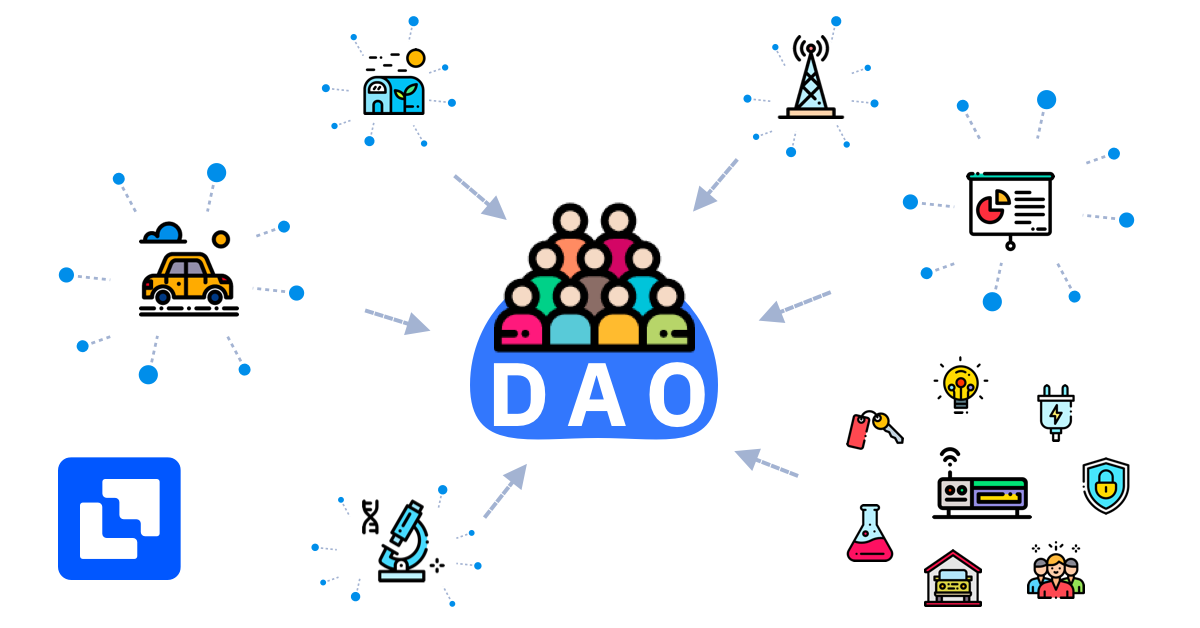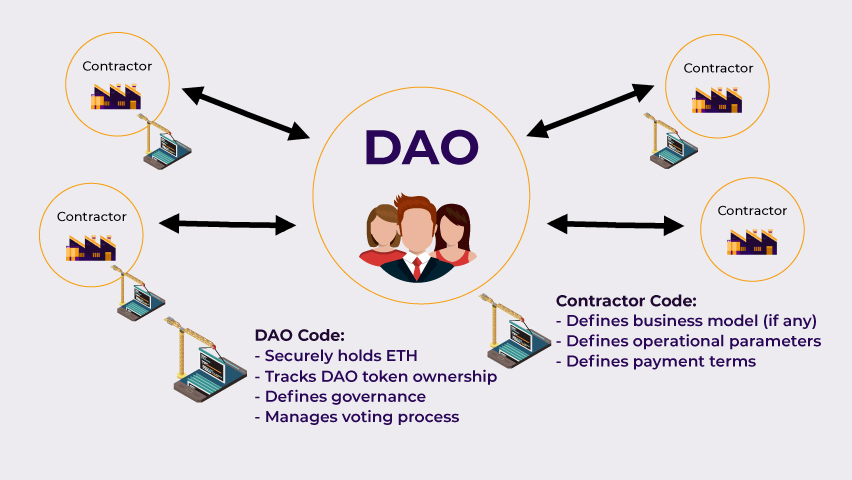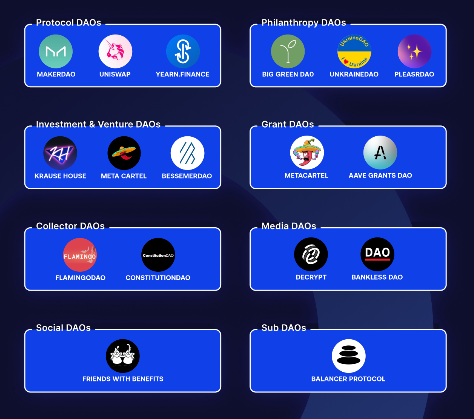What is DAO? A DAO is a decentralized autonomous organization, formed by a group of people who decide to follow certain rules to meet common goals. Let’s find out what is special about this project with Weakhand in this article.
What is a KNIFE?
Overview of DAOs
DAO stands for Decentralized Autonomous Organization and is a decentralized autonomous organization, established by a group of people with a common goal of acting for the highest good of the organization. However, what makes DAO different from traditional organizations is that DAO is fully automated using Smart Contracts to set the basic rules for the organization. Decisions made by the community are made through many forms such as: Voting,…
Today, DAO is widely applied in many different fields, such as in Defi protocols using a decentralized governance model, a decentralized investment fund,… However, everything has its own benefits. The common feature is that members of the organization can easily participate in DAO decisions and verify proposals and activities within the organization.

What is DAO?
Background of the birth of DAO
Although DAO may have originated in the 1990s, it was not until 2013 that it was widely adopted. Especially the appearance of Ethereum in 2014 when Ethereum provided developers with tools to create decentralized applications including DAO, allowing the community to self-manage and operate activities within the network. an organization in a transparent manner.
The DAO’s security incident led to an attack and loss of tens of millions of dollars in 2016, leading to many concerns about the safety of DAO models at that time. But as an inevitable need, DAOs now continue to develop, operate and be applied in many different areas in the Crypto market.
How Does DAO Work?
DAO’s operating model is based on programmed Smart Contracts that define the general rules of an organization. These Smart Contracts are responsible for all DAO operations without human intervention. While a Smart Contract is valid on the blockchain, no one can change the rules except by a vote.
DAO operations are typically implemented through votes. Any changes made must first gather votes from members of the organization. After the decision receives the approval of the majority of members, specific changes will be put into effect.

DAO operating model
A user’s voting power is typically based on the number of tokens they hold. This means that users who invest more money in the DAO will have higher governance rights. For example, Alice owns 25% of project A’s tokens, so in every vote Alice will have at least 25% of the votes. This is also a painful problem that current projects are having to deal with when investment funds account for the majority of the project’s tokens, so the removal will be manipulated by large organizations.
Advantages and Disadvantages of KNIFE
Advantages of DAO
- DAOs allow many like-minded individuals to come together easily to carry out a specific task.
- Members have more say in the organization’s development plans, strategies and operations.
- Votes are public on the Blockchain, thus encouraging members to be more responsible in their voting.
Disadvantages of DAO
- It often takes longer to make decisions because there are more people involved in voting.
- DAO at this time is still quite new and causes difficulty in accessing it for some individuals.
- Treasury theft activities can take place if the DAO is not well secured.
Benefits Of KNIFE
DAOs are becoming increasingly popular in various fields from sports, arts and finance to crowdfunding. There are many benefits it brings to individuals and organizations that want to pursue a DAO structure. Here are some key benefits:
- Decentralization: Decisions that affect the organization are made collectively and not based on a few individuals as in traditional organizations. This helps give equal importance to every individual in the organization and every member has a common voice when making decisions in the organization. However, the DAO is also not completely decentralized as investors holding more tokens will have more voting privileges.
- Joining: Organizational members have a higher voice and have the right to contribute opinions on the development direction of an organization. This encourages them to participate in votes in DAO activities.
- Public: In a DAO, votes cast via Blockchain will be publicly visible. Because every member’s decisions are viewable, they provide accountability to members to act in a way that is best for the organization.
- Community: DAO encourages people around the world to connect with each other to achieve common goals. You only need an Internet connection and a DAO governance token to join the DAO organization.
Popular Types of Knives Today
There are many DAO models that are popular at the moment. However here are some popular DAO patterns:

Popular types of DAO today
Protocol DAOs
Protocol DAOs is a DAO model designed to govern a decentralized protocol. Applications that adopt this DAO model often aspire to become a community-owned decentralized protocol. This is achieved through a voting-based governance model that allows anyone who owns a project token to participate in voting on decisions on the platform. Some popular projects in this field include: MakerDAO, Uniswap, Yearn Finance,…
Grant DAOs
Grant DAOs are blockchain-based non-profit organizations created to manage and distribute funds supporting projects throughout the Web3 ecosystem. Management and distribution processes are performed automatically through Smart Contracts and decisions are made by the member community through voting. Some projects in this area are: Aave Grants DAO – a community-led program to fund ideas and projects that promote the development of Aave Protocol,…
Philanthropy DAOs
Philanthropy DAOs are decentralized organizations created to manage charitable funds. Philanthropy DAOs community members make decisions about the distribution of funds and monitor charitable projects through Smart Contracts and online voting tools. Philanthropy DAOs can support health, education, environmental and community projects. Some Philanthropy DAOs projects include Big Green DAO, UkraineDAO,…
Social DAOs
Social DAOs are a type of DAO whose purpose is to focus on the community aspect by bringing together like-minded individuals such as builders, artists, and creators. Although Social DAOs are community-focused, they typically have barriers to entry such as owning a specific number of tokens or owning a certain NFT to participate in the DAO. Some examples of Social DAOs include: Developer DAO – a DAO comprised of a group of web3 developers focused on building the future of web3, Friends with Profit – a DAO focused on building community and promoting promote creativity,…
Collector DAOs
Collector DAOs are a type of DAO created to mobilize the community and jointly contribute their assets to a Treasury. Each member owns a stake corresponding to their investment and can be rewarded with DAO tokens in the future. Some notable Collector DAOs projects include: FlamingoDAO, ConstitutionDAO,…
Venture DAOs
Venture DAOs is a DAO consisting of many members who pool capital to invest in early-stage web3 startups. In a Venture DAOs, members vote to decide whether to invest in projects instead of depending on a centralized manager. Some Venture DAOs projects include: Krause House DAO, MetaCartel Ventures,…
Media DAOs
Media DAOs are a DAO belonging to the media sector. Media DAOs allow the community to participate in the management and development of the media content and services they love, while simultaneously generating income for participants in the DAO organization. Some examples of Media DAOs projects include: BanklessDAO, Decrypt,…
SubDAO
SubDAO is a new type of DAO created by larger DAOs for specific purposes. SubDAO is used to manage projects or specific areas allowing community members to participate in decisions and carry out activities on a smaller scale, increasing transparency and authority. community force.
summary
Nowadays, DAOs are becoming increasingly popular and applied in many different fields not only in the web3 world but also in the real world. DAO is also considered a new operating model for protocols and organizations that want to decentralize and wish to receive all contributions from community members. Above is all the information I want to provide about DAO, hope everyone has received useful knowledge.


